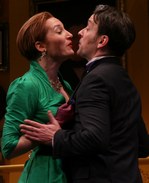SITE GUIDE
SEARCH
REVIEWS
REVIEW ARCHIVES
ADVERTISING AT CURTAINUP
FEATURES
NEWS
Etcetera and
Short Term Listings
LISTINGS
Broadway
Off-Broadway
NYC Restaurants
BOOKS and CDs
OTHER PLACES
Berkshires
London
California
New Jersey
DC
Connecticut
Philadelphia
Elsewhere
QUOTES
TKTS
PLAYWRIGHTS' ALBUMS
LETTERS TO EDITOR
FILM
LINKS
MISCELLANEOUS
Free Updates
Masthead
A CurtainUp Review
The New York Idea
By Elyse Sommer
|
. . . I think Sir Wilfred may have been right about something.
He said a woman should marry only when she has a whim for the man.— Cynthia A whim? Oh fine. Marry for whim! The New York idea of marriage. Marry for whim and leave the rest to luck and the divorce courts. — Philip, whose belief that marriage should be for keeps and monogomous is challenged by Cynthia's ex-husband John with "Wake up, Judge. The modern American marriage is a wire fence. The woman's the wire, the posts are the husbands. One, two, three, and onward, post after post, up hill, over the horizon, all the way to the Dakotas." |

Francesca Faridany and Jeremy Shamos
(Photo: Ari Minz) |
The promotional material states that the play was very popular in its day. Though it did open on Broadway to positive reviews that premiere ran for a rather underwhelming 66 performances. Still, it was revived once in 1915 (length of the run unknown) and crossed the pond to play in England and Germany.
The name of the author, Langdon Mitchell, is unlikely to ring a bell with most people and his biggest success seems to have been an adaptation of Thackeray's Vanity Fair. This gives him something in common with David Auburn, who has done a good bit of adapting and directing since his own award winning Proof. Unlike The Journals Of Mihail Sebastian (r eview) which Auburn felt compelled to adapt for the stage, his work on Mitchell's play was commissioned by the Atlantic Theater Company.
To start with the good news. The company has gone all out with a big cast featuring many of the regulars who make an Atlantic Theater membership as close to a repertory company esperience as you can get. The actors are led by one of New York's most capable directors, Mark Brokaw. The production values also pass muster. Allen Moyer's drawing room scenery may not be quite as grand as what's on display in the current Broadway revival of The Importance of Being Earnest, but it's flexible enough to take us from Washington Square to Fifth Avenue and back. The costumes by Michael Krass support the Old New York flavor.
The story, revolves around a too hastily divorced and still in love young couple, Cynthia and John Karslake. With a divorcee's life a rather lonely business at this time, Cynthia is about to have another go at marriage, this time a more friendship than passion based alliance with an older man, Philip Philimore. His very proper relatives are willing to overlook her being a divorcee and a "sporty" woman since she's from a good family. Besides, Philip, a judge on the New York Supreme Court, is also divorced. His eccentric ex-wife is very much part of the events preventing the nuptial knot to be tied as planned.
Does all this sound a bit like a precursor to Noel Coward's ever popular Private Lives? Well, so it is — with a horse racing angle thrown in for extra fun, and the Washington Square locale promising the possibility of seeing the comic complications edged with of some more serious satiric commentary about the social prejudices explored by Edith Wharton.
But hold off on the standing ovation. The expert director and hardworking cast notwithstanding, pulling The New York Idea out of the theatrical attic's forgotten play corner turns out not to be an idea without problems. Mitchell's play may resemble Private Lives, but if it once matched that comedic staple's Cowardesque panache and elegance, this new version is way too predictable as well as being saddled with quite a few flat spots.
Okay, so Private Lives isn't exactly loaded with suspense either. The many productions, not to mention a movie available as a DVD, have long made its outcome inevitable. Yet it retains its glittery glamour and remains a magnet for starry performances so that its very familiarity brings its own appeal to any revival. Mitchell's play, though applauded in its day and with its added twist about the main couple's passion for horse racing, lacks that revisiting an old friend appeal. Consequently it somehow comes across too much like a variation of the Coward play that had yet to be written in 1906.
The New York Idea' s ensemble is refreshingly large. It includes the requisite butler, disapproving relatives and an English nobleman to add further romantic complications. When considered as an ensemble, the actors can't be faulted. However, what's missing is some sizzling star power. Jaime Ray Newman, who is making her New York stage debut, is charming and lively as the central romantic figure — young Mrs. Cynthia Karslake-soon-to-be-Mrs. Philip Philimore. But this is not a star-is-born WOW performance. Jeremy Shamos, who has wowed me in some shows he's been in, is quite good as Cynthia's ex-husband but this is not an ideal role for him.
Felicia Faridany and Michael Countryman, are somewhat more ideally cast as the second couple in this marital quadrille. Countryman ably conveys the man whose unexpressed passions are smothered beneath Philip Philimore's pomposity. Faridany, last seen in The 39 Steps and who here plays the eccentric, non-conformist first Mrs. Philimore, might have been a more interesting choice to play the horse loving, impetuous Cynthia. She might have played the part with a harder veneer, like Mrs. Fiske, the actress for whom Mitchell wrote the play. But then, David Auburn's adaptation leans more towards being a romantic farce than the original author's blend of a comedy tinged with a more serious satiric flavor.
All things considered, this adaptation left me with mixed feelings. I'm not a purist about conflating three and four act plays to eliminate one intermission. Nor do my eyebrows go up at eliminating some minor characters or changing some outdated dialogue But when a play is given new life in order to introduce audiences to a largely forgotten playwright, a revision as drastic as this threatens to undermine that intent.
While Mr. Auburn has kept the basic plot and the best dialogue, he has not only rearranged scenes but changed background facts — for example, Cynthia is no longer heir to a multi-million dollar fortune, which in the original's first cene amusingly sees Philip's kinfolk become more willing to welcome Cynthia into the family, thus pointing a finger at the hypocrisy of the proper Old New York society. Another telling alteration in that first scene, is that it doesn't include Philip's ex-wife Vida. Having all the key players in the romantic scenario interact in that opening scene set the satirical tone in the original script. Auburn's delaying Vida's entrance may account for the current production's taking its time to grab hold.
Some of this adaptive restructuring does work quite well, especially in the latter part of the play. However, having read Langdon Mitchell's own comments as well as a fascinating essay by the influential Scottish critic and playwright William Archer which are included with the free e-text of the original at Project Gutenberg (http://www.gutenberg.org/ebooks/25565), I can't help wondering how Mitchell would react if sent back to the land of the living long enough to see this production. No doubt he'd be please do see his play back on stage — but I suspect he might have been happier if it involved less tampering with his text. That said, the somewhat too drastic Auburn script update hasn't kept Atlantic Theater's fans from snapping up enough ticket for A New York Idea to extend its original closing date by two weeks even before the official opening.
|
The New York Idea David Auburn adaptation of play by Langdon Mitchell Directed by Mark Brokaw Cast: Patricia O'Conell (Mrs. Philimore), Michael Countryman, (Philip Philimore), Francesca Faridany (Vida Philimore), Mikaela Feely-Lehmann (Jacqueline), Rick Holmes (Wilfred Cates-Darby),, John Keating (Fiddler),, Peter Maloney (Sudley), Jaime Ray Newman (Cynthia Karsdake), Jeremy Shamos (John Karsdake), Joey Slotnick (Matthew Philimore) , Tom Patrick Stephens (Thomas) Scenic design by Allen Moyer Costume design by Michael Krass Lighting design by Mary Louise Geiger Original music by Lewis Flinn Period etiquette and style: Frank Ventura Dialect coach: Ben Furey Stage manager: Jenna Woods Running Time: 1 hour and 50 minutes with one intermission Atlantic Theater Company at The Lucille Lortel Theatre 121 Christopher Street www.atlantictheater.org ' From 1/06/11; opening 1/26/11 Original 2/13/11 closing extended to 2/26/11. Tuesday-Saturday at 8pm, with Wednesday and Saturday performances at 2pm and Sunday performances at 3pm (with some performance variations). All tickets are $65. Reviewed by Elyse Sommer at January 20th press preview |
|
REVIEW FEEDBACK Highlight one of the responses below and click "copy" or"CTRL+C"
Paste the highlighted text into the subject line (CTRL+ V): Feel free to add detailed comments in the body of the email. . .also the names and emails of any friends to whom you'd like us to forward a copy of this review. Visit Curtainup's Blog Annex For a feed to reviews and features as they are posted add http://curtainupnewlinks.blogspot.com to your reader Curtainup at Facebook . . . Curtainup at Twitter Subscribe to our FREE email updates: E-mail: esommer@curtainup.comesommer@curtainup.com put SUBSCRIBE CURTAINUP EMAIL UPDATE in the subject line and your full name and email address in the body of the message. If you can spare a minute, tell us how you came to CurtainUp and from what part of the country. |

Slings & Arrows-the complete set
You don't have to be a Shakespeare aficionado to love all 21 episodes of this hilarious and moving Canadian TV series about a fictional Shakespeare Company






